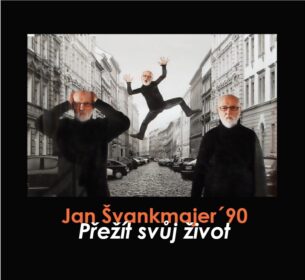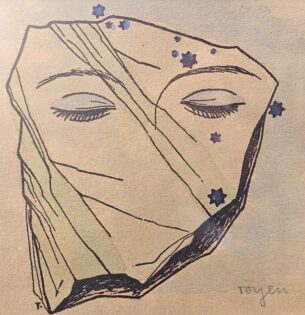Mentální vrstevnice III. – Siločáry / Mental Contours III. – Lines of Force (15. 10. – 11. 11. 2014)
Jste zváni na výstavu jenž vznikla ve spolupráci s Creative Growth Art Center a artbrut.cz za podpory Americké ambasády: / You are invited to the exhibition prepared in cooperation with with Creative Growth Art Center and artbrut.cz with the support of American Embassy:
Mentální vrstevnice III. – Siločáry / Mental Contours III. – Lines of Force
(15. 10. – 11. 11. 2014)
Pokračování projektu Mentální vrstevnice. Tentokrát tvorba umělců z USA pracujících s písmem, znakem, linií…
Continuation of the project Mental contours – this time american artists working with fonts, charakter, lines…
vernisáž / opening: středa/ wendesday: 15. 10. 2014 , 18h / 8 p.m.
autoři / authors:
Martin John
Laura Jo Pierce
Dwight Mackintosh
Dan Miller
Donald Mitchell
William Tylor
Merritt Walace
kurátorky / curated by:
Terezie Zemánková
Nadia Rovderová
Ivana Brádková
událost na facebooku můžete sledovat zde: https://www.facebook.com/events/707239536028382/
fotografie z výstavy, vernisáže můžete shlédnout zde: https://www.facebook.com/media/set/?set=a.722787831127241.1073741855.100551130017584&type=3&uploaded=2
tisková zpráva / press release:
Mentální vrstevnice III. – Siločáry
Creative Growth Art Centre působící v kalifornském Oaklandu (USA) je jedním z nejstarších ateliérů zaměřených na rozvoj výtvarného talentu umělců s duševním onemocněním a mentálním hendikepem na světě. Pravidelně do něj dochází bezmála 200 klientů. Ateliér není zaměřen arteterapeuticky – pracují v něm profesionální výtvarníci, kteří mají za úkol zdejší tvůrce podporovat v hledání jejich vlastního výtvarného vyjádření. I proto odsud vzešlo mnoho výjimečných umělců, kteří dosáhli světové proslulosti. Řada z nich je zastoupena ve veřejných i soukromých sbírkách art brut, někteří autoři (včetně Dana Millera) jsou dokonce prezentováni ve stálé sbírce Muzea moderního umění v New Yorku.
Jsme hrdí, že se nám do galerie Artinbox podařilo přivézt exkluzivní výběr sedmi umělců a položit tak další důkazy o unikátní estetice, imaginaci, barevné i grafické kombinatorice a síle sdílených emocí, kterými umělci art brut disponují.
Výstava Siločáry vznikla díky podpoře Americké ambasády. Naše poděkování patří také řediteli Creative Growth Tomovi di Mariovi a jeho kolegyni Gaële Fernández.
„Vítejte v Creative Growth, největším a nejdéle fungujícím uměleckém centru založeném na myšlence, že tvořivost je vlastní všem lidem bez ohledu na jejich postižení: stačí jen dostat možnost vyjádřit se.
Příběh našeho Centra není bez zajímavosti. Abyste pochopili, kdo vlastně jsme, je třeba vědět něco o dějinách – konkrétně o tom, co se dělo v USA, konkrétně v Kalifornii v šedesátých a sedmdesátých letech dvacátého století. Tehdy byli lidé s vývojovým a mentálním postižením běžně umisťováni do léčeben a ústavů a předpokládalo se, že stráví celý život mimo většinovou společnost. Obvykle tedy žili smutný, odstrčený život, často v podmínkách, které se dají s čistým svědomím označit za neutěšené.
Centrum Creative Growth se nachází v kalifornském Oaklandu, ležícím přes záliv naproti svému sesterskému San Francisku. Obě velkoměsta se před mnoha desítkami let stala středobodem zásadní společenské proměny. Konec šedesátých a začátek sedmdesátých let byl v Americe poznamenán kulturní revolucí – byla to doba tažení za svobodu slova, doba vzestupu kultury hippies, protiválečného hnutí a bouřlivého rozvoje rockové muziky i proslulého „léta lásky“.
Nové myšlenky vyústily v mnohé společenské změny včetně nového pohledu na to, jak by měli žít lidé s postižením. Na základě těchto nových představ rozhodl stát Kalifornie, že ústavy, kde hendikepovaní doposud trávili čas, budou zrušeny, a že je třeba se postarat, aby se opět platně začlenili do prostředí, ze kterého pocházejí.
Středisko Creative Growth založili Elias a Florence Katzovi, dva umělci a snílci, kteří si položili otázku: co budou tito lidé dělat, až z ústavů a léčeben odejdou? Odpověď Creative Growth centra je založena na myšlence, že kreativitu člověk dostává do vínku a že za příznivých podmínek se může právě umění stát pojítkem mezi lidmi, kteří až dosud žili ve státních institucích, a novým světem, jemuž musejí tak náhle čelit.
Úplně na začátku se malovalo u Katzových doma u stolu. Postupně se ale program Centra rozšiřoval až do dnešní podoby, kdy po šest dní v týdnu ve velké dvoupatrové průmyslové budově v Oaklandu tvoří skoro dvě stovky hendikepovaných umělců.
Vyznáváme zásadu: tvorbu podporuj, ale neřiď. Všichni naši zaměstnanci jsou výtvarníci, jelikož si myslíme, že při procesu tvorby mohou být právě oni nejvíc nápomocní. Nepředepisují žádná témata, zato povzbuzují jednotlivce, aby si k tvorbě našli svou vlastní cestu.
Jak naše středisko rostlo, rostli i naši klienti. Jsme hrdí, že jediní tři umělci s vývojovou vadou zastoupení ve stálé sbírce newyorského Muzea moderního umění – Dan Miller, William Scott a Judith Scott – tvořili právě u nás v Creative Growth.
Pro mě osobně je ale podstatný přístup, který naši umělci zaujímají k tvorbě samotné. Je to praktický proces, v němž mají estetická komunikace a kladené otázky stejnou hodnotu jako objekt, který se během tohoto procesu zrodí. Výtvory, jež v centru vznikají, jsou divácky poutavé; nabízejí nám vhled do života našich umělců a do jejich vidění světa.
To, co máte v Praze možnost spatřit, je výsledkem těchto snah – je to komunikační propojení mezi umělcem a divákem. Každý tvůrce působící v Creative Growth je sice jedinečný, jedna obecná věc jim je ale společná: všichni zkoumají, co je to být člověkem a jak každý z nás interpretuje svou drobnou úlohu ve světě, který dohromady sdílíme.
Je nám ctí, že můžeme dílo našich umělců představit v Praze, a možnosti poprvé vystavovat v České republice si velice ceníme. Doufám, že díla našich umělců vás osloví svým nadšením i estetickou silou tak, jako by jejich výrazný umělecký hlas promlouval z druhé strany zeměkoule přímo k vám.
Tom di Maria
Ředitel Creative Growth Art Centre
Oakland, Kalifornie, září 2014
Mental Contours III. – Lines of Force
Creative Growth Art Centre operating in Oakland, California (USA) is one of the oldest studios in the world focused on the development of art talent of artists with mental illness and mental handicap. It is attended regularly by nearly 200 clients. The studio is not focused on art therapy – there work professional artists, whose task is to encourage the local creators in the search for their own artistic expression. That is also why many exceptional artists who have achieved international fame came from here. A number of them are represented in both public and private collections of art brut, some authors (including Dan Miller) are even presented in the permanent collection of the Museum of Modern Art in New York.
We are proud that we were able to bring to the Artinbox Gallery an exclusive selection of seven artists and bring forward further evidence of the unique aesthetics, imagination, colour and graphic combinatorics, and the power of shared emotions, which art brut artists possess.
The exhibition Mental Contours III. – Lines of Force was prepared with the support of the American Embassy.
Our thanks also go to the Director of Creative Growth, Tom di Mario, and his colleague, Gael Fernández.
Welcome to Creative Growth. We are the oldest and largest independent art center in the world dedicated to the idea that all people – regardless of disability – can be creative if offered an opportunity to express themselves.
Our story is interesting. To understand fully who we are you must know a bit about history – specifically American and California history from the 1960s and 1970s. At that time, it was considered normal for people with developmental and intellectual disabilities to be placed in hospitals and institutions, where they would spend their lives outside of mainstream society – leading often sad and private lives in conditions that were sometimes dismal.
Creative Growth is located in Oakland, California, just across the Bay from its sister city San Francisco. These cities were the center of significant social change many decades ago. The late 1960’s and early 1970’s marked a time of cultural revolution in America – the creation of the free speech movement at the University of Berkeley, the rise of Hippie culture, anti-war protests, a reaction to tradition, the explosion of rock music, and the famous Summer of Love.
These new ideas led to many changes in our society, including a re-thinking of how people with disabilities might live in the world. Because of these new ideas, the State of California made a decision to close the institutions where people with disabilities lived, and sought to have them become active participants in the communities from where they came.
Creative Growth’s founders – Elias and Florence Katz – were artists and dreamers who asked the question – what will these people do when they leave the hospitals? Creative Growth’s answer was founded on the idea that creativity is an inherent human form of expression, and that if offered the opportunity, art could serve as a link between the people who lived in institutions, and the new world they were being exposed to.
Our program started with paint on a table in our founders’ own home. Day after day, the program grew into what is now a 6-day a week program, serving nearly 200 artists with disabilities in a large two floor industrial building in Oakland.
We have a specific philosophy in our work – support creation, don’t direct it. Our entire staff is artists, as we believe that artists can be the most supportive part of the artistic process. Not imposing ideas, but encouraging individuals to find their own path to creativity.
As Creative Growth has grown, our artists have grown with us. We are delighted that the only three artists with developmental disabilities in the permanent collection of the Museum of Modern Art in New York are Creative Growth artists: Dan Miller, William Scott and Judith Scott.
What is most compelling for me however, is the approach that our artists take towards art making. It is a process driven practice where communicating aesthetically, and asking questions, have as much value as the object created as a result of this work.
The objects that are created in the studio are interesting to viewers, and offer us a perspective on the lives of our artists and how they view the world around them.
What you are seeing here in Prague is a result of the efforts – a communicative link between artist and viewer. While every Creative Growth artist’s work is unique there is a commonality that they all explore what it means to be human, and how we each interpret what it means to be a part of the world we share.
Presenting our artists work in Prague is an honor for us, and we are deeply appreciative of the opportunity to have this exhibition in the Czech Republic for the first time. I hope that the passion, aesthetic power and strong voice of the artist is one you can hear in their work…as if it has traveled directly to you from the other side of the world.
Tom di Maria
Director of Creative Growth Art Center
Oakland California, September 2014


